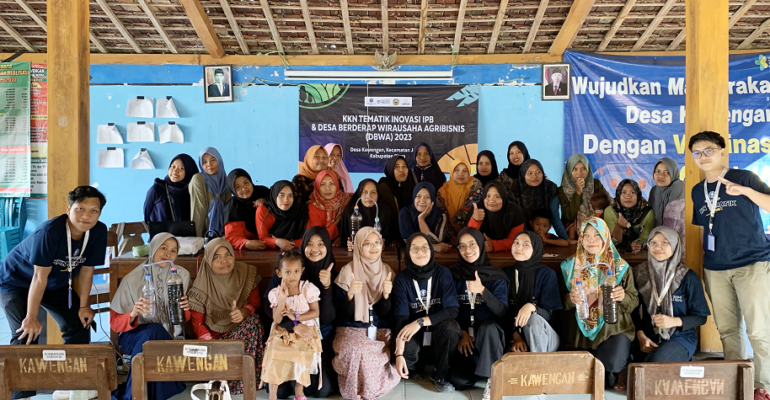Ecopori, IPB University Innovation KKN-T Program Helps Household Organic Waste Treatment in Kawengan Village

The Thematic Real Work Lecture Team (KKN-T) of IPB University Innovation carried out a program of sustainable environmental management action activities in Kawengan Village, Jepon, Blora Regency, Central Java, with the title ‘Ecopori (Eco-enzymes and Biopores)’. This program is present as an effort to manage and utilize household organic waste in Kawengan Village.
Vivi Dowinda, chair of the Innovatiom Real-Thematic Work Lecturer team, said that this program was motivated by the potential of the village, which includes rice and corn as the main agricultural commodities, as well as breeding and fattening cattle as livestock commodities. However, according to the Head of Kawengan Village, Sulasno, the problem that the village has is the price of fertilizer, which tends to be expensive, and the dry land. In addition, the chairman of the PKK, Nisrina Nurhamida, also said that so far there has been no utilization of organic waste in Kawengan Village.
“IPB University Innovation KKN-T students are here to bring program innovations to overcome these problems through Ecopori activities. The Ecopori program is aimed at members of the family welfare empowerment group (PKK). The majority of them work as housewives,” said Vivi during an activity at Kawengan Village Hall some time ago.
The activity began with socialization related to ecoenzymes and biopores, consisting of the presentation of definitions, benefits, tools, and materials, from how to make them to how to use them.
“Ecoenzymes are versatile natural liquids resulting from the fermentation of organic waste and sugar or molasses. This liquid can be used as liquid organic fertilizer (POC), floor and air cleaners, dishwashers and clothes, and many more things,” explained Vivi to the participants, who seemed enthusiastic about listening to the students’ presentations.
Meanwhile, she continued, biopores are water infiltration holes from organic waste that can increase fertility and groundwater quality, prevent flooding, and serve as a source of compost.
In the action of making ecoenzymes, the organic matter used is citrus fruit. Later, the results of the ecoenzyme will be given to PKK members of Kawengan Village. Unlike the case with making biopores, as many as 10 infiltration holes are prepared, which are then filled with organic waste such as dry leaves, twigs, and other household organic waste. The making of this biopori hole was carried out at PKK Heart Park, right next to Kawengan Village Hall.
“Hopefully the people of Kawengan Village can continue to carry out sustainable environmental management actions. We hope that with this ecoenzyme, people can produce their own POC for their agricultural activities. While this biopori is hopefully able to improve the quality of agricultural land and as a source of compost,” said Vivi. (*/Rz) (IAAS/MZS)



